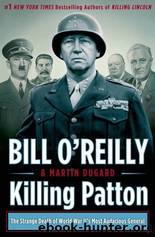Killing Patton: The Strange Death of World War II's Most Audacious General by O'Reilly Bill & Dugard Martin

Author:O'Reilly, Bill & Dugard, Martin [O'Reilly, Bill & Dugard, Martin]
Language: eng
Format: epub
Tags: Leaders & Notable People, Americas, Historical, Biographies & Memoirs, War, 20th Century, United States, Military, World War II, History, Biography, Military & Spies, Professionals & Academics
ISBN: 9780805096699
Amazon: B00JYZAPXY
Goodreads: 22143906
Publisher: Henry Holt and Co.
Published: 2014-09-23T07:00:00+00:00
16
TRIER, GERMANY
MARCH 13, 1945
MORNING
George S. Patton is on the move.
Finally.
Sgt. John Mims drives Patton in his signature open-air jeep with its three-star flags over the wheel wells. The snows of the cruel subzero winter are melting at last. Patton and Mims pass the carcasses of cattle frozen legs-up as the road winds through Luxembourg and into Germany. Hulks of destroyed Sherman M-4s litter the countrysideâso many tanks, in fact, that Patton makes a mental note to investigate which type of enemy round defeated each of them. This is Pattonâs way of helping the U.S. Army build better armor for fighting the next inevitable war.
It is a conflict that Patton believes will be fought soon. The Russians are moving to forcibly spread communism throughout the world, and Patton knows it. âThey are a scurvy race and simply savages,â he writes of the Russians in his journal. âWe could beat the hell out of them.â
But thatâs in the future, after Germany is defeated and the cruel task of dividing Europe among the victors takes center stage. For now, it is enough that the Third Army is advancing into Germany. Patton has sensed a weakness in the Wehrmacht lines and is eager to press his advantage.
It was four weeks ago, on February 10, when Dwight Eisenhower once again ordered Patton and his Third Army to stop their drive east and go on the defensive and selected British field marshal Bernard Law Montgomery to lead the massive Allied invasion force that will cross the strategically vital Rhine River. It is a politically astute maneuver, because while Montgomery officially reports to Eisenhower, the British field marshal believes himself to beâand is often portrayed in the British press asâEisenhowerâs equal. Winston Churchill publicly fueled this portrayal by promoting Montgomery to field marshal months before Eisenhower received his fifth star, meaning that for a time Montgomery outranked the supreme commander of the Allied forces in Europe. Now Eisenhowerâs decision to throw his support to Montgomeryâs offensive neatly defuses any controversy that might have arisen over Eisenhower giving Patton the main thrust.
Stretching eight hundred miles down the length of Germany from the North Sea to Switzerland, the Rhine is the last great obstacle between the Allies and the German heartland. Whoever crosses it first might also soon know the glory of being the first Allied general to reach Berlin.
It is as if Pattonâs monumental achievement at Bastogne never happened.
âIt was rather amusing, though perhaps not flattering, to note that General Eisenhower never mentioned the Bastogne offensive,â he writes of his most recent discussions with Eisenhower. Then, referring to the emergency meeting in Verdun that turned the tide of the Battle of the Bulge, he adds, âAlthough this was the first time I had seen him since the nineteenth of Decemberâwhen he seemed much pleased to have me at the critical point.â
Even more galling, not just to Patton but also to American soldiers, is that Montgomery has publicly taken credit for the Allied victory at the Battle of the Bulge.
Download
This site does not store any files on its server. We only index and link to content provided by other sites. Please contact the content providers to delete copyright contents if any and email us, we'll remove relevant links or contents immediately.
| Afghan & Iraq Wars | American Civil War |
| American Revolution | Vietnam War |
| World War I | World War II |
Waking Up in Heaven: A True Story of Brokenness, Heaven, and Life Again by McVea Crystal & Tresniowski Alex(37794)
Empire of the Sikhs by Patwant Singh(23074)
We're Going to Need More Wine by Gabrielle Union(19035)
Hans Sturm: A Soldier's Odyssey on the Eastern Front by Gordon Williamson(18575)
Leonardo da Vinci by Walter Isaacson(13318)
The Radium Girls by Kate Moore(12018)
Tools of Titans by Timothy Ferriss(8369)
Educated by Tara Westover(8047)
How to Be a Bawse: A Guide to Conquering Life by Lilly Singh(7472)
Permanent Record by Edward Snowden(5839)
The Last Black Unicorn by Tiffany Haddish(5629)
The Rise and Fall of Senator Joe McCarthy by James Cross Giblin(5275)
Promise Me, Dad by Joe Biden(5144)
The Wind in My Hair by Masih Alinejad(5092)
A Higher Loyalty: Truth, Lies, and Leadership by James Comey(4954)
The Crown by Robert Lacey(4807)
The Iron Duke by The Iron Duke(4349)
Joan of Arc by Mary Gordon(4101)
Stalin by Stephen Kotkin(3957)
